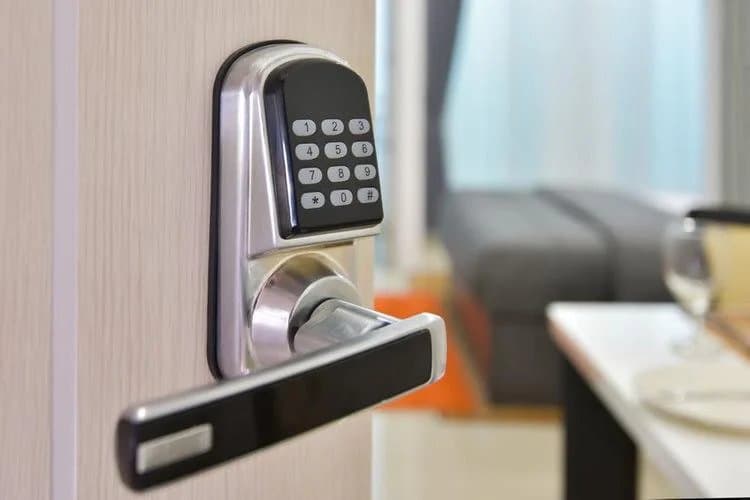These days, almost everyone has heard of smart locks. They appeal to our desire for convenience and security by allowing us to lock and unlock our doors remotely.
But are they really as secure as we think? In this blog post, we’ll take a deep dive into the technology behind smart locks to find out.
Spoiler alert: It’s not always as simple as it seems.
smart locks and their promises of security and convenience
Smart locks are becoming more popular in the smart home industry as a way to improve security, make life easier, and give people a better sense of overall peace of mind.
They give you more control over who can get in through the door without you having to be there or give away your security codes.
Remotely locking the door at any time, no matter where you are, can bring a sense of ease to your home’s safety.
Smart locks also make it less likely that you’ll lose your key. You no longer have to worry about losing a physical key.
Smart locks are a safe and reliable way for homeowners to protect themselves and make their lives easier.
the technology behind smart locks and how they work
Smart locks are the embodiment of technological progress, allowing homeowners to masterfully control their security from a remote device.
Utilizing a Bluetooth connection, the lock can be unlocked without having to fumble for your keys in the wee hours of the night, providing both enhanced security and convenience.
Smart locks have created an entirely new pathway for our homes’ safety, all thanks to an intricate combination of Wi-Fi-enabled access, motion detection sensors, and smartphone apps — truly a triple threat.
the potential vulnerabilities of smart locks and how hackers could exploit them
As more and more homeowners take advantage of the convenience, security, and peace of mind that smart locks offer, new potential vulnerabilities are arising.
Since smart locks are connected to WiFi networks, they can be subject to hacking by sophisticated cybercriminals who may have access to private information or even control over doors.
While many smart lock companies have implemented various security measures to ensure safety, understanding the risks is key to preventing exploitation.
It is important for homeowners to be mindful of their device’s security settings and software updates in case a new vulnerability is discovered.
Homeowners can help prevent hackers from getting into their devices by taking precautions like changing their passwords often and calling customer service as soon as they notice anything suspicious.
how to make sure your smart lock is as secure as possible
Smart locks are a great way to give your home an extra layer of security.
But if you’re going old-school on safety, here are a few tips to help you make sure your smart lock stays as secure as possible:
Make sure your passwords and unlock codes are strong and unique; no one else should ever have access to them.
Change the batteries regularly, ideally more often than is suggested by the manufacturer, so there’s never any risk of them dying at an inopportune moment.
Don’t forget about the physical security measures either; for example, make sure the door frame is both structurally sound and securely fitted with bolts or screws.
And don’t publicly advertise or disclose too much information about how you’re using your smart lock; after all, it just might invite someone to try their luck.
pros and cons of using a smart lock in your home
Smart locks offer a number of benefits to the homeowner, such as increased security, convenience, and peace of mind.
On the other hand, installation is often more expensive than regular locks, and there can be troublesome delays in certain responses due to a poor or unstable internet connection or server issues.
Any mechanical issue would also have to be addressed with a service call.
To conclude, smart lock technology is still relatively new, and although it brings many positive attributes to home security, it’s important for any prospective user to consider both the advantages and possible drawbacks before making a purchase.
In the end, it is up to the homeowner to weigh the pros and cons of using a smart lock in their home.
While smart locks provide convenience and make our homes safer, we need to be aware of the potential vulnerabilities in any lock, whether traditional or digital.
Taking steps like never sharing your password, always securing your wireless connection, not leaving your keys unattended, and regularly reviewing access logs will go a long way toward protecting your home from unwanted visitors.
Smart locks are quickly becoming an integral part of home security systems, but they require diligence on our part if they are truly going to keep us safe.
Learn more about Smart Home Security
